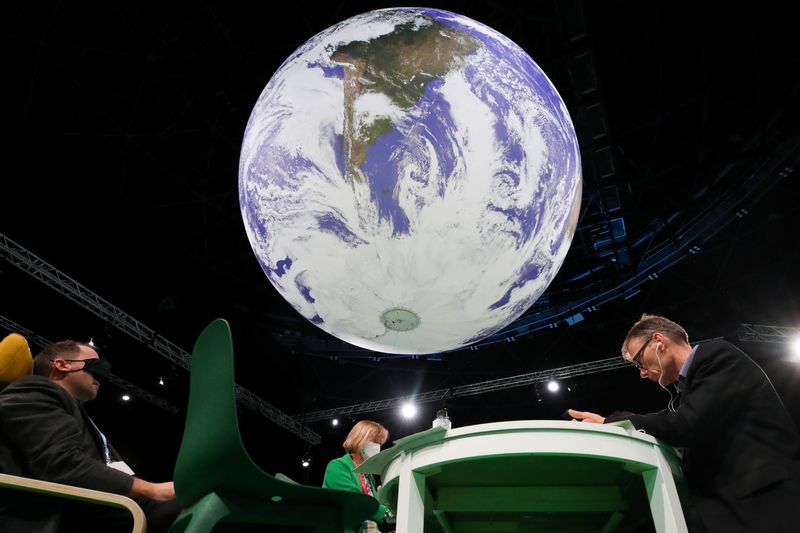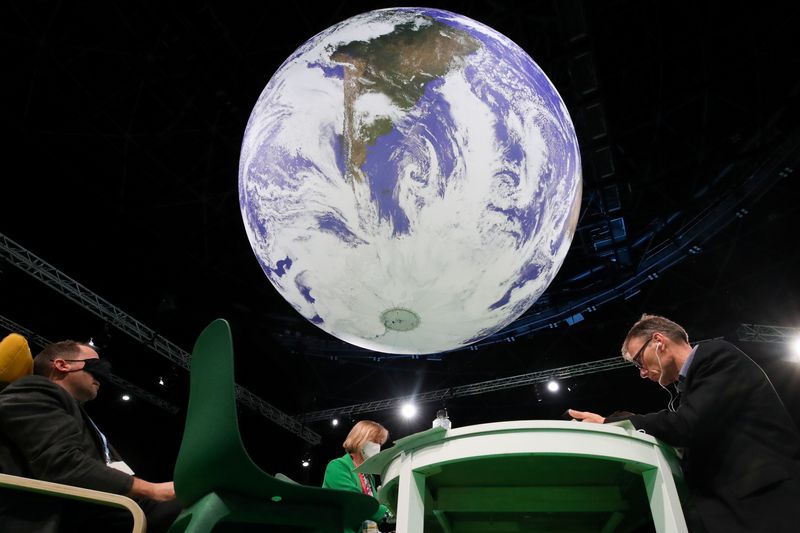
FILE PHOTO: Delegates rest during the UN Climate Change Conference (COP26), in Glasgow, Scotland, Britain November 12, 2021. REUTERS/Yves Herman/File Photo
November 13, 2021
By Kate Abnett and Elizabeth Piper
GLASGOW (Reuters) – Negotiators took the U.N. climate talks in Scotland into an extra day on Saturday, after two long weeks of wrangling, to try to agree a deal that would give the world a realistic shot at avoiding the worst effects of global warming.
Alok Sharma, the British conference president, said he expected COP26 to close on Saturday afternoon with a deal between the almost 200 countries present, ranging from coal- and gas-fuelled superpowers to oil producers and Pacific islands being swallowed by the rise in sea levels.
A fresh draft deal was released on Saturday, and like earlier versions it attempted to balance the demands of climate-vulnerable nations, big industrial powers, and those whose consumption or exports of fossil fuels are vital to their economic development.
China, the biggest current emitter https://graphics.reuters.com/CLIMATE-UN/EMISSIONS/jnvwexaryvw/index.html of greenhouse gases, and Saudi Arabia, the world’s top oil exporter, were among a group of countries seeking to prevent the final deal including language that opposes subsidies for fossil fuels, the main cause of global warming, two sources told Reuters on Friday.
However, the new draft, published by the United Nations, continued to single out fossil fuels – something no U.N. climate conference has yet succeeded in doing.
It also urged rich countries to double finance for climate adaptation by 2025 from 2019 levels, offering funding that has been a key demand of small island nations at the conference.
The meeting’s overarching aim is to keep within reach the 2015 Paris Agreement’s target to cap global warming at 1.5 degrees Celsius (2.7 Fahrenheit) above pre-industrial levels.
Scientists say that to go beyond that limit would unleash extreme sea level rise and catastrophic weather extremes, including crippling droughts, monstrous storms and wildfires far worse than those the world is already suffering.
But national emissions-cutting pledges made so far would cap the average global temperature rise at only 2.4 Celsius. While there is little chance of that gap being closed in Glasgow, Sharma said he hoped the final COP26 deal would pave the way for deeper cuts.
WAIT AND SEE
U.S. climate envoy John Kerry struck a positive note when asked late Friday whether he agreed with climate campaigner Greta Thunberg that COP26 was a “festival for ‘business as usual’”.
“Obviously I don’t agree,” he replied, “and I think you will see that when you see what happens.”
Kerry helped to revive flagging hopes for the conference when he and Chinese negotiator Xie Zhenhua on Thursday announced the countries would ramp up efforts to preserve forests, needed to soak up and hold in carbon dioxide from the atmosphere, and to cut output of the second-most important greenhouse gas, methane.
The U.S.-China agreement requires both countries to set aside mutual tensions over other political differences.
The White House said on Friday that U.S. President Joe Biden, who has succeeded in pushing $555 billion in climate measures through Congress in a post-pandemic recovery programme, will hold a virtual meeting with Chinese leader Xi Jinping on Monday night, U.S. time.
AMBITION AND FINANCE
The newest draft of what many hope will be the final Glasgow agreement also retained a significant demand for nations to set tougher climate pledges next year, rather than doing so every five years as they are currently required.
Money remains one of the thorniest issues to resolve, with developing countries pushing for tougher rules to ensure that rich nations, whose historical emissions https://www.reuters.com/business/cop/biggest-carbon-emitter-blame-game-troubles-cop26-talks-2021-11-11 are largely responsible for heating up the planet, offer more cash to help them adapt to its consequences.
Rich countries have failed to meet a 12-year-old goal to provide $100 billion a year in so-called “climate finance” by 2020, undermining trust and making some developing countries more reluctant to curb their emissions.
The sum, which falls far short of what the United Nations says countries actually need, aims to both enable poor countries to transition their energy sources away from fossil fuels, and help them prepare for and manage increasingly extreme climate events.
The latest draft said rich countries should double the funding set aside for adaptation by 2025, from 2019 levels.
(Additional reporting by William James, Simon Jessop, Valerie Volcovici, Richard Valdmanis and Jake Spring; Writing by Kevin Liffey; Editing by Katy Daigle and Frances Kerry)

